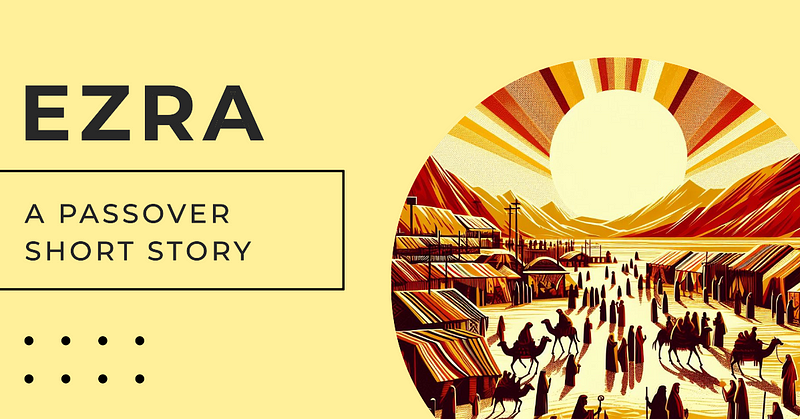- Communion Book Club
- Posts
- Happy Passover: A Short Story
Happy Passover: A Short Story
An Exodus Tale

Ezra: An Exodus Short Story
Imagine a bustling marketplace beneath the blazing Egyptian sun. Here, amid the cacophony of shouts and haggling, lives a young boy named Ezra. Ezra, with eyes that sparkle with a curious glint, belongs to a family bound by the chains of servitude. Generations of his ancestors have toiled under the iron fist of Pharaoh, their dreams of freedom withering.
One scorching afternoon, Ezra finds himself drawn to a peculiar sight — an elderly woman, veiled and cloaked, weaving a narrative with the practiced ease of a seasoned storyteller. Her voice, a low murmur laced with the echoes of a forgotten freedom, weaves a tale of a time before — a time when the Israelites walked tall, not as slaves, but as a people.
She speaks of a promised land, overflowing with milk and honey, a land where figs plump on the trees and laughter dances on the wind. A collective sigh ripples through the crowd — a yearning for something more, something beyond the drudgery of their existence. The woman, sensing their silent plea, reveals a hidden truth.
“Tonight,” she whispers, her voice barely audible, “Death will pass over our homes. But there is a secret,” she continues, her eyes gleaming with an otherworldly light, “a secret to ensure your survival.” She reaches into her cloak and produces a flatbread, its texture unlike anything Ezra has ever seen. “This,” she declares, “is matzah, the bread of affliction. Eat it tonight, and Death will pass over you.”
Intrigued, Ezra rushes home, his heart pounding with a mixture of fear and excitement. He relays the incredible story to his family, their faces etched with a mixture of skepticism and a flicker of hope. As the desert sun bleeds into dusk, they gather around a meager table, the weight of generations pressing down on them.
Following the veiled woman’s instructions, they devour matzah, its dryness a stark reminder of their harsh reality. Yet, with each bite, faith ignited within them. They are not merely slaves; they are a people marked for deliverance.
Later that night, a bloodcurdling scream pierces the stillness. Panic erupts as news spreads — the firstborn sons of Egypt lie lifeless. But in the homes of the Israelites, a hush falls — a quietude filled with awe and gratitude. Death has passed over them, just as the veiled woman promised.
The following morning, a newfound determination courses through the Israelite community. Pharaoh, shaken to his core, concedes to their demands. With trembling hands, he allows them to leave, their exodus a testament to the power of faith and the enduring promise of freedom.
Benefits for Christians
● A Deeper Understanding of Christ’s Sacrifice: By understanding the Israelites’ yearning for freedom, we gain a richer appreciation for the liberation Jesus offers from sin and death.
● Hope in the Face of Trials: The Passover story reminds us that even in the darkest of times, God remains faithful and delivers His children.
● Shared Heritage with Judaism: Passover connects us to the Jewish faith, highlighting our shared Abrahamic heritage.
Conclusion
As Christians, we celebrate Passover not only as a miraculous historical event, but as a powerful foreshadowing of Christ’s sacrifice, the ultimate act of deliverance that sets us free from the shackles of sin and death.
The Passover story, woven with threads of hope and resilience, transcends the boundaries of time. It is a testament to the enduring human spirit and God’s unwavering promise of liberation.
Reflection Question
The Passover narrative, like the hidden matzah, holds a powerful message for today’s Christians. How does the story of the Exodus foreshadow the redemptive act of Jesus Christ, offering you liberation from bondage of sin and death?